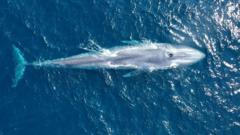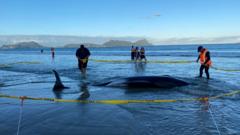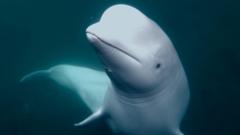In Timor-Leste, citizen scientists, aided by marine ecologists, are using drones and local knowledge to study pygmy blue whales, documenting nearly 3,000 sightings over a decade. Their initiative highlights the potential of integrating community efforts into marine conservation and eco-tourism.
Citizen Scientists Illuminate the Lives of Pygmy Blue Whales in Timor-Leste

Citizen Scientists Illuminate the Lives of Pygmy Blue Whales in Timor-Leste
Local fishermen and marine ecologists team up in Timor-Leste to document the behaviors and migration patterns of pygmy blue whales through innovative citizen science initiatives.
In a remarkable community-driven initiative, fishermen in Subaun, Timor-Leste, are playing a pivotal role in uncovering the secrets of pygmy blue whales. During the whale migration season from October to November, Faustino Mauloko da Cunha and his son Zacarias venture into the South Pacific in a dugout canoe. Equipped with binoculars and a telephoto camera, they await the majestic appearances of these colossal marine mammals.
Upon spotting a whale, the local team springs into action, deploying a drone under the guidance of marine ecologist Karen Edyvane. With these aerial tools, they capture crucial footage and photographs that contribute to understanding the elusive behaviors of pygmy blue whales—one of the largest animals on Earth.
Since the project's inception in 2014, the team has recorded close to 3,000 whale sightings, a staggering figure according to Prof. Edyvane. Operating on a modest budget, the collaborative effort has garnered significant insights into the whales, including previously undocumented reproductive behaviors. In a breakthrough this past July, the team captured footage of a mother nursing her calf, providing a rare glimpse into the life cycle of these enigmatic creatures.
The initiative, which began as a simple Facebook group, has evolved into a larger community project with participants actively sharing sightings and updates via social media platforms. The locals' enthusiasm in reporting whale sightings has fostered a strong sense of community and engagement.
As the demand for whale-watching tours rises, local tourism has started to flourish. Workshops and training have been implemented to enhance skills within the community, including drone operation and ecological observation, ensuring local individuals are at the forefront of this growing industry.
However, with increased tourism comes the responsibility of sustainability. Local non-profits have voiced concerns about the possible impacts of unregulated whale tourism, motivating the government to ensure protective measures backed by Prof. Edyvane's research. With proper regulations, whale tourism could provide valuable economic opportunities in one of the world's poorest nations, where annual incomes remain staggeringly low.
The da Cunha family has adapted to the influx of tourists, offering meals made from local ingredients and the day's catch, creating a multi-faceted approach to community income generation. Zacarias has also expanded his role to include drone services, aiding the research team and educating tourists about marine conservation practices.
Through this dynamic collaboration between citizen scientists and professional ecologists, the study of pygmy blue whales in Timor-Leste stands as an inspiring example of how local knowledge and innovative technology can work hand in hand to promote conservation and understand the profound mysteries of our ocean's giants.






















